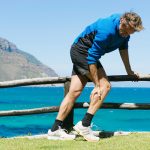You could be hydrating wrong
The popularity of large, portable water bottles may mean people are drinking more water, but volume can be misleading. When not accompanied by food or nutrients, water moves quickly through the human digestive system and adds little value.
“It sounds silly, but many of us drink water the wrong way,” says Dennis Cardone, DO, an osteopathic sports medicine specialist and chief of primary care sports medicine at NYU Langone Health. “Fortunately, a few simple changes will vastly improve your hydration.”
Hydration is an essential part of self-care. Water keeps the body from overheating and helps maintain the function of every system in the body. Even mild dehydration can interfere with a person’s mood or ability to concentrate.
“I encourage people to drink water with a meal or snack, which is going to be a much more effective way to sustain hydration,” Dr. Cardone notes. “Fruits, in particular, are hydrating on their own and will help the body absorb more water.”
How much water does a person need?
Specific quantities are hard to prescribe because different people have different hydration needs, says Dr. Cardone.
Athletes and pregnant women will need to drink more liquids. Additionally, people who sweat more will want to hydrate more. And certain medical conditions, such as diabetes or heart disease, may also require the intake of more fluids because some medications act as diuretics, causing the body to lose more fluid.
But there’s a simple way to determine your hydration level.
“One of the best methods to check for proper hydration is urine color,” says Dr. Cardone. “You are well-hydrated if your urine is colorless or light yellow. If your urine is dark yellow, you need to drink more fluids.”
For the average person, the popular 8 glasses a day is a good goal, he says. Water should be consumed steadily throughout the day and with food. If you’re eating a lot of fruit or vegetables, you may need less.
For those who don’t like to drink water
If you prefer sparkling, or fizzy water, there’s good news. It is as hydrating as plain water. The bubbles, however, may make it feel like you’ve consumed more, at least temporarily.
Sports drinks, which are marketed as more effective for hydration, are best used only after intense workouts that last an hour. Juice, like sports drinks, typically has a greater quantity of sugar and calories, which may negate any caloric benefits gained from a short or light workout.
Coffee, tea and alcoholic drinks—which are more diuretic—will pass more quickly through the body. So while these beverages still supply water to the body, they are less effective sources of hydration.
Beware of over-hydration
Over-hydration is most common during endurance sports such as marathons. It can occur from consuming slightly less than one gallon of water in an hour.
While rare, an individual who drinks excessive water while exercising, typically over a period of hours, can release too many electrolytes in their urine, which can lead to a low balance in the body’s sodium levels. This is called hyponatremia and can be life-threatening.
Symptoms of hyponatremia include headache, nausea, vomiting, confusion, double vision, trouble breathing, cramping and difficulty breathing. Seek medical counsel if you’re experiencing any of these signs, says Dr. Cardone.

